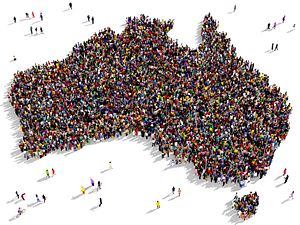As it seems that Brexit was primarily driven by an anti-immigration sentiment, and the rise of Donald Trump in the United States is fueled by similar concerns, it could be reasonable to suspect that these countries’ southern cousin Australia may succumb to similar forces within its current election campaign.
However, thankfully, this is proving not to be the case. Aside from the leadership of both major parties maintaining a hardline stance towards those seeking asylum, the subject matter of immigration as a concept to be challenged has been noticeably absent from the campaign.
There is a strong public narrative that portrays Australia as a country hostile towards foreigners, yet this perspective is almost entirely driven by the asylum seeker debate. While there are minor grumbles, nativist instincts, Islamophobic opportunists, and a tiny group of bumbling fascist wannabes, Australia as a whole maintains a healthy view toward immigration.
Last week, Australia’s premier foreign policy think tank, The Lowy Institute, issued their annual poll, surveying Australians on a broad range of issues important to understanding Australia’s perspectives and interests. Their survey found that in several areas related to immigration, Australians maintained a positive perspective.
Just under three-quarters of those surveyed agreed to statements that immigrants have a positive impact on the economy, strengthen the country due to their hard work and talents, and that immigration from many different countries makes Australia stronger.
On the more populist negative questions, 40 percent of people believed that immigrants were a burden on the welfare state, and only 35 percent subscribed to the persistent economic fallacy that immigrants take jobs away from natives.
There are a number of factors that have assisted Australia in avoiding the potentially dangerous emotions that are currently being inflamed in both Europe and the United States.
The 2011 census data revealed that 46 percent of the population has at least one parent born outside of Australia, a figure that undoubtedly will rise when the next census is taken in August of this year. This personal connection combined the predominantly urban nature of Australia’s population growth, assists in creating a broader social and global understanding within a public that is able accommodate ethnic and cultural difference.
On top of this, unlike much of the developed world, Australia has gone 25 years without a recession, preventing finger-pointing at recent arrivals for an economic slump. Ironically for those prone to such knee-jerk reactions, Australia’s immigration program has been a significant factor in Australia maintaining its economic success.
Another major factor is the bipartisanship that exists between both major parties for a large immigration program. This political cooperation is driven by the acknowledgement that immigration remains essential to maintaining Australia’s wealth.
Australia currently has a median age 38.4 years old, which is healthier than many other wealthy countries who have median ages above 40, but high enough to cause policymakers some concern.
Consistent with Western trends, Australia’s fertility rate has dropped from 3.5 children per woman in the early 1960s, to a rate of around 1.8 at present. The current replacement rate, to maintain the number of people currently within the country, and more importantly, to maintain high levels of workforce participation, is 2.1 children per woman. Indicating that a significant level of immigration is necessary in order to not only maintain the country’s wealth, but to fund its pension, welfare, and universal healthcare schemes.
In the 10 years since 2006 Australia has had a migrant intake fluctuating between 150,000 and 300,000 people per year. This intake consists of permanent skilled migrants, family reunion migrants and humanitarian migrants. In the past five years migrants from India and China have overtaken the United Kingdom as the largest source countries. These two countries together are currently making up close to half Australia’s immigration intake.
There is also significant movement to Australia from the multi-ethnic New Zealand, as New Zealand citizenship grants holders permanent residency in Australia. However, due to New Zealanders being able to come and go as they please their numbers are not counted under the permanent migration statistics.
Alongside permanent migrants, there are close to 330,000 overseas students currently holding visas, and another 100,000 people currently in the country working on temporary (long stay) skilled visas. Both of these visa categories have pathways towards permanent residency.
What is surprising about Australia’s successful transition from a staunchly protectionist, ethnically homogeneous society to a thriving and harmonious multicultural one, is the lack of a prominent positive public narrative that exists in a comparable migrant country such as Canada (even within the Conservative Party).
While Malcolm Turnbull has recently taken to proclaiming Australia “the most successful multicultural country in the world” (a claim Canada may dispute), he frames the pronouncement through the negative lens of “border security” as the key to protecting “legal” migration. Yet this tactic to play the concepts of skilled migration and asylum seekers off against each other still contains an antagonistic sentiment with the potential to undermine the necessity of the country’s immigration program.
While Australian civil society is doing extremely well adapting to the modern reality of people movement and cultural overlap, the country’s politicians need to be wary of the demons they could potentially unleash if they do not make their appeals to the public’s better angels and rational capabilities.

































